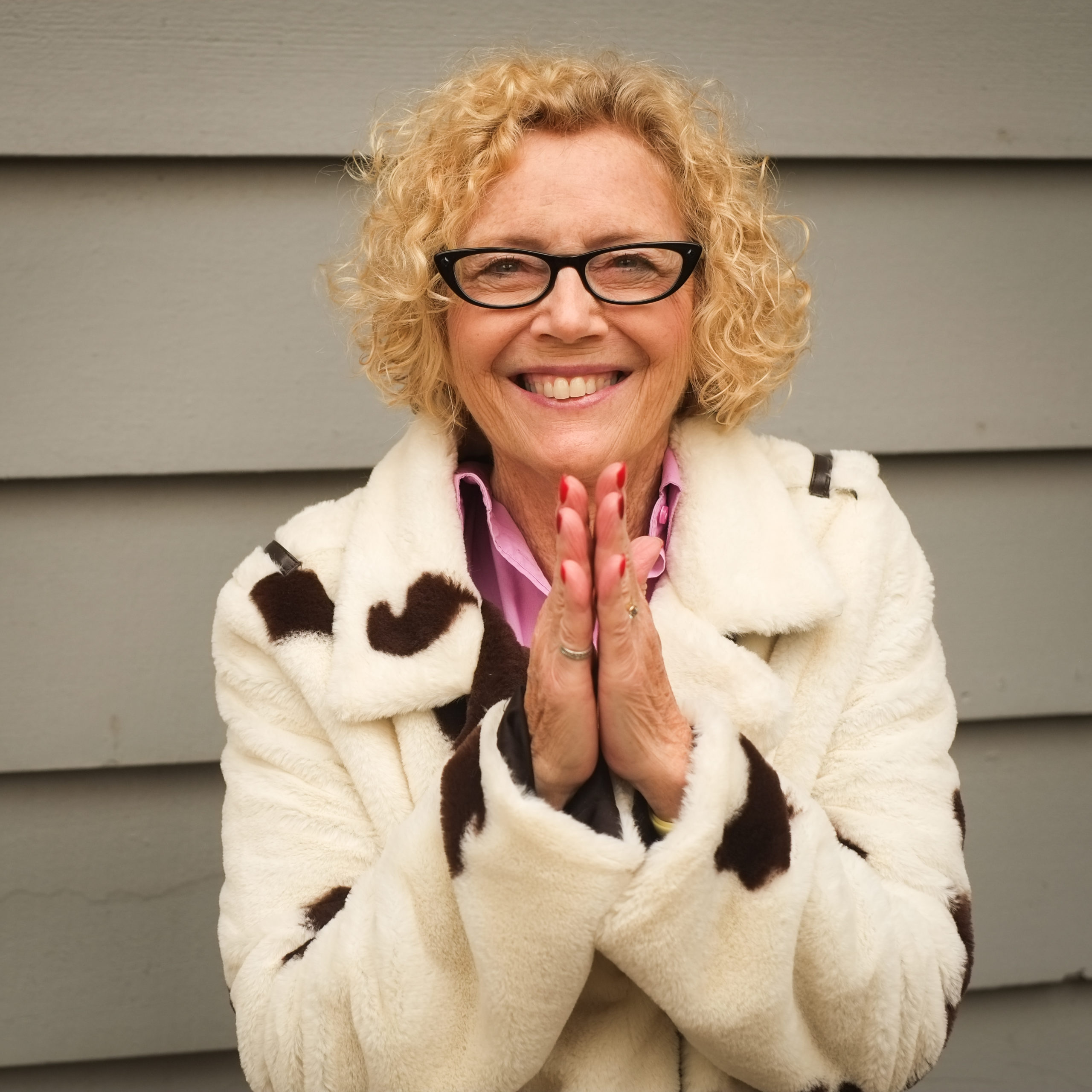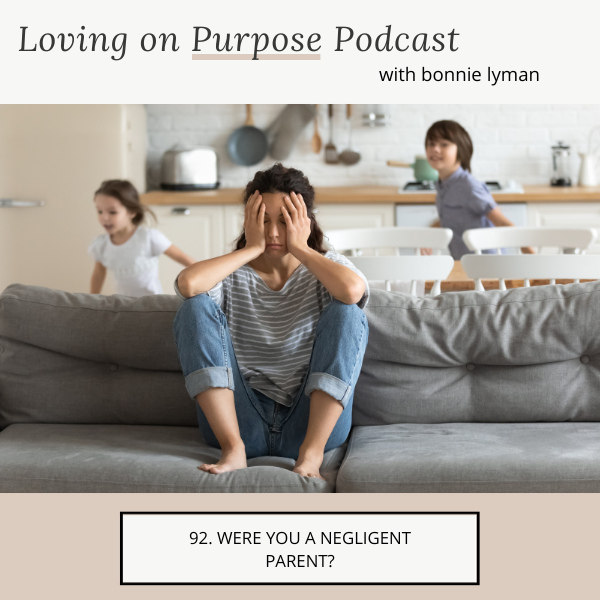
Work With Me
Well you are in the right place. Let's get started.


Episode 92: Were You a Negligent Parent? You're listening to the podcast, Loving on Purpose. This is episode 92, Were You Ever Loving? a negligent parent. Welcome to the podcast Loving on Purpose. I'm your host, Bonnie Lyman. If you're having trouble navigating through your relationships with your adult children, if you are struggling to connect with them or having specific challenges, you're in the right place. Hello, all of you out there. I hope you're having as beautiful a fall as we're having. I don't think I've had a nicer week than what we've had this last week. It's gotten to reach the temperature of 70 degrees every day and the leaves are coloring, changing to these beautiful red and orange and yellow. And I have this cute little dog that needs a walk every day and it gives me the opportunity to be outside. And, um, I, I am grateful to be living where I live and living in this country. I want to thank you for joining me again this week, and I hope I share something with you that softens your heart and brings more love to your family. It comes up often. When I'm coaching clients about when their, their children aren't behaving in a very kind way, or they're maybe not calling them as often, responding to text, including them, whatever, many of them revert back to thinking it was their fault. And. that they didn't teach their kids to respect them when they became adults. And so they blame themselves for not being a good enough mother. And that's why they're thinking anyway, mom's thinking, why these kids don't include them more. in their lives. But that is a lie our brain wants to tell us, because as I have mentioned before, there was not one day you got up and said, I am not going to be a good mom today. I'm not going to teach them right from wrong. I'm just, Not going to be a good mom today. There wasn't a day that that happened and it was subconscious, but you got up every day and you, we all did. We did our best. Yes, in some days we were tired and we weren't as good a mom as other days, but we did our best. There are several factors involved in what kind of a relationship you have with your adult children and none of them have anything to do with child raising techniques. We don't teach people how we want them to treat us. It's impossible to do that. It comes from their thoughts that causes them to have feelings that cause them to act a certain way. We are kind to people when we have loving, kind thoughts about them and our behavior shows up as such. And it's a lot easier to do that if we are happy. or if we've had enough sleep, or if we haven't had something disappointing happen to us, it's easier to have those kind thoughts. It's always our feelings that cause behavior and feelings are emotional. They are vibrations in our bodies caused by our thoughts and some hormones and some neurons getting excited and We call hunger and fatigue, these type of quote unquote feelings, we call those sensations, but those can affect how we act also. So, it... How a person treats another person comes from thoughts triggered by what's happening in their lives. What's happening now, not when they were 12, unless they were treated very abusively. And then that, we, we can see why, um, perhaps they're being unkind to their parents. But it's, it's women thinking because their children aren't being kind and including them and treating them the way they taught, taught, treating them the way they treated their parents that perhaps it was that they never taught them. I don't work with people that, um, abusively, um, mistreat their children, or I don't work with people that were abused as children. Those type of people need to go see a therapist. There's probably some great trauma that they're even calling. It's a form of post traumatic stress. I work with women who did their best to raise kind, responsible children. So I help them to see from a different perspective of why their children are not on purpose trying to be unkind to them. Number two, my clients tend to think there is something wrong with them, the parent, and that's why their children don't reach out to them. They think, their children think, that they, the mom, are not important anymore, but it's the parent vision or expectation of how their children should be treating them that is not being fulfilled. That is causing the pain, and I would say that it was not intentional most of the time that they did this. There's something going on in their life that is causing them. They take all the blame for their children not including them more in their lives because they feel they must not. have taught them how to be respectable to their mom. There is a 50 percent chance that this is true, but there's more than a 50 percent chance that they think that their parents are so sufficient and so accomplished at embracing the challenges of challenges of their lives, that they don't need extra help or attention. They sometimes just forget to let their, their mom know about their child's soccer game, or perhaps the respectful Loving thing to do is to not tell them about the soccer game so that they're not putting added pressure on their mom if they aren't able to attend the game. I had one client tell me in talking to their adult son that he felt like he had to walk on eggshells around his mother for fear of upsetting her. And she... What if we just allowed everyone to be themselves? What if our first choice was to default to love? Where are we getting these prescriptions from, these manuals from, that this is how it's supposed to be? We need to throw out the manual. of our expectations. Let's just let people be themselves. And sometimes that means allowing them to be grumpy and snippy when they are hungry or maybe tired or disappointed of not getting that promotion they thought they were going to get from their employment. Another thing we can do is start approving of ourselves more. Accepting your strengths and your faults. I mean really intentionally doing this. You will have a greater understanding and love of your adult children when you practice this. We are all born with a very strong neck. negativity bias. We just go to the negative by default. It is so much easier to do that, and it was a way of protecting us from danger, but by intentionally focusing on the positive about ourselves. can cause you to approve more of all the people in your life. We all know that nobody is perfect, but we hurt ourselves by expecting them to be. We pick and choose what weaknesses in others are acceptable to us. Let it go. You don't have to approve or condone your children's actions, but you can still love them despite you don't approve of. That's what Jesus Christ did. That's why I try hard to follow Jesus's teaching. This is the path to happiness. Love and forgiveness and not judging. Always feel good. Judging and holding grudges and being disappointing, disappointed in how our children act toward us. is not happiness. If you want to teach your adult children to respect you more, then you're going to have to respect them more. Not for the behavior you think is disrespectful. But for what they do that you do feel is respectful. If we want our children to be more loving to us, then we need to be more loving to them. Genuinely so. And unconditionally. This means... You're going to have to train your brain to focus on what you like about them, and what you admire about them. This means you need to work on being a better you, and just let them be themselves. We all need to have more respect for each other, and just let Letting a person, let's call him Joe, be as Joe as he can be. Love is always the magic factor because love always wins. Love causes us to always feel good and has more power in healing relationships in ways we never dreamed possible. Withdrawing. Trying to get even, withholding our love does not guilt them or scare them into wanting to love us more. It's our responsibility to be the most loving person we can be. It's not our responsibility to try to change others. It's our responsibility to be willing to feel. Some negative emotions in our life. It's part of the deal of coming to earth. Thank you for listening to me today. I ask you to leave a review. If you like my podcast, DM me at, um, on Instagram. at Bonnie Lyman Coaching. If you have topics that you would like me to discuss, and if you're really struggling in your relationship, I offer a free complementary strategy relationship call that can perhaps ease your pain. And help you see what options there are to get help in healing your relationship. It was fun talking to you, and I'll talk to you next week. If you liked this, this episode, and you felt it was of benefit to you, I ask you to share it with somebody that perhaps it could also benefit. But if you're still feeling kind of stuck in that you don't know how to apply what was talked about or where to start on, on changing your thoughts, on changing your perspective, on bettering your relationship. Get on a call with me and we can have a discussion and I can tell you how to apply it and where we start. And then you get to decide what you want to do about this relationship that maybe you're struggling with with your adult children. There is no reason to go on the rest of our lives. Struggling with our relationships, with our adult children. Let's assume the best. Let's assume that we all love each other and we're just trying to figure out how to maintain our own boundaries and respect another one's. But I can help you with everything. So just go to BonnieLyman. com and book a call. I can't wait to hear from you. .